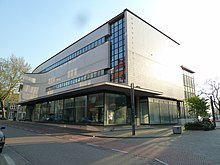Dirk Brouwer (architect): Difference between revisions
rem per WP:HATNOTE |
Added ref. Swapped Template:Unreferenced with Template:More citations needed #NOV24 |
||
| (2 intermediate revisions by 2 users not shown) | |||
| Line 1: | Line 1: | ||
{{mcn|date=November 2024}} |
|||
{{Short description|Dutch architect}} |
{{Short description|Dutch architect (1899–1941)}} |
||
{{unreferenced|date=March 2009}} |
|||
[[File:Dirk Brouwer.jpg|thumb|D. Brouwer]] |
[[File:Dirk Brouwer.jpg|thumb|D. Brouwer]] |
||
[[File:Heerlen-Doctor Poelsstraat 6.JPG|thumb|Former HEMA store, [[Heerlen]] (1939)]] |
[[File:Heerlen-Doctor Poelsstraat 6.JPG|thumb|Former HEMA store, [[Heerlen]] (1939)]] |
||
'''Dirk Brouwer''' ({{IPA |
'''Dirk Brouwer''' ({{IPA|nl|ˈdɪr(ə)ɡ ˈbrʌu.ər}}; November 23, |
||
1899 in [[Alkmaar]] – November 17, 1941 in [[Overveen]]) was a [[Dutch people|Dutch]] [[architect]]. His father was a [[concierge]] at a local technical school. |
1899 in [[Alkmaar]] – November 17, 1941 in [[Overveen]]) was a [[Dutch people|Dutch]] [[architect]]. His father was a [[concierge]] at a local technical school. |
||
| Line 10: | Line 10: | ||
His buildings were designed according to the [[Amsterdam School]] and he cooperated with [[Willem Marinus Dudok]], a notable assertor of [[Modernism]], thus Brouwer's style was influenced. In 1938 he designed the backside and possibly also the [[dome light]] of the [[Bijenkorf]] department store in Amsterdam. He also built the HEMA store in [[Heerlen]]. |
His buildings were designed according to the [[Amsterdam School]] and he cooperated with [[Willem Marinus Dudok]], a notable assertor of [[Modernism]], thus Brouwer's style was influenced. In 1938 he designed the backside and possibly also the [[dome light]] of the [[Bijenkorf]] department store in Amsterdam. He also built the HEMA store in [[Heerlen]]. |
||
In [[World War II]] he joined the resistance and the editors of the illegal magazine [[Vrij Nederland]]. He was therefore executed by German troops in the dunes near Overveen in 1941. |
In [[World War II]] he joined the resistance and the editors of the illegal magazine [[Vrij Nederland]]. He was therefore executed by German troops in the dunes near Overveen in 1941.<ref>{{Cite web |date=2023-02-19 |title=Dirk BROUWER {{!}} Stichting De Eerebegraafplaats te Bloemendaal |url=https://www.eerebegraafplaatsbloemendaal.eu/dirk-brouwer.html |archive-url=https://web.archive.org/web/20230219165658/https://www.eerebegraafplaatsbloemendaal.eu/dirk-brouwer.html |archive-date=2023-02-19 |access-date=2024-11-07 |website=De Eerebegraafplaats te Bloemendaal |language=nl}}</ref> |
||
Latest revision as of 16:48, 7 November 2024
This article needs additional citations for verification. (November 2024) |


Dirk Brouwer (Dutch pronunciation: [ˈdɪr(ə)ɡ ˈbrʌu.ər]; November 23, 1899 in Alkmaar – November 17, 1941 in Overveen) was a Dutch architect. His father was a concierge at a local technical school.
After three years of studies Dirk Brouwer learned from various architects and attended a course for Higher Architectural Education in Amsterdam.
His buildings were designed according to the Amsterdam School and he cooperated with Willem Marinus Dudok, a notable assertor of Modernism, thus Brouwer's style was influenced. In 1938 he designed the backside and possibly also the dome light of the Bijenkorf department store in Amsterdam. He also built the HEMA store in Heerlen.
In World War II he joined the resistance and the editors of the illegal magazine Vrij Nederland. He was therefore executed by German troops in the dunes near Overveen in 1941.[1]
References
[edit]- ^ "Dirk BROUWER | Stichting De Eerebegraafplaats te Bloemendaal". De Eerebegraafplaats te Bloemendaal (in Dutch). 2023-02-19. Archived from the original on 2023-02-19. Retrieved 2024-11-07.
